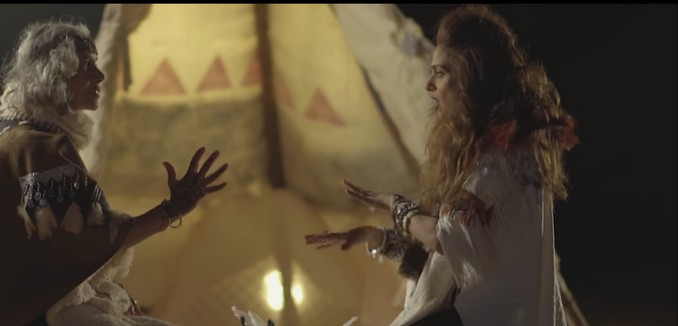In Magi’s latest music video, “Alashoo,” from her soon-to-be-released debut album of the same name, young women clad in streetwear — short shorts, belly shirts and sports bras — circle the singer, throwing attitude, caressing each other and drinking Corona.
It has the makings of any girl-powered hip-hop video, but another element takes center stage here: The song is not in English or even in Hebrew, but in Arabic, with the Eastern melody and beats to match.
For an Israeli-Jewish artist who grew up on the streets of Tel Aviv, this may seem like an unlikely twist, but only if you don’t know the real Maggie Hikri.
“I used to steal my older brothers’ CDs, sit in my room and sing for hours. I was always attracted to the thought of singing in Arabic, but the opportunity came to do so professionally when I started working with English music producer Juno Reactor. From there I started to hear and learn the language and my family’s roots,” says Hikri.
Modern though her music may be, Hikri also credits the Yemenite synagogue in her neighborhood as one of her musical influences, alongside soul, funk, hip-hop, electronic beats, and the legendary Egyptian singer Umm Kulthum, whose records her Iraqi grandmother played in their house.
Music producer Ron Bunker, guitarist for the popular group Balkan Beat Box, known for blending traditional music with hip-hop beats, helped her focus these sounds to create the distinctive style found on the album.
“Me and Ron met, I sang to him Yemenite hymns while he played, and we just clicked and started gathering materials and writing an album together.”
The album’s just-released debut single, “Debka Rafiach,” features a duet with veteran Israeli-Yemenite singer Lea Avraham, who also sings in Arabic.
It has the makings of any girl-powered hip-hop video, but another element takes center stage here: The song is not in English or even in Hebrew, but in Arabic, with the Eastern melody and beats to match.
In the past, Hikri has collaborated with Orphaned Land, a group that sings in English and has a large following in Turkey and Iran; and Haim Laroz, who sings in Hebrew.
“Alashoo” is filled with thoughtful stripped-down flowing vocals and romantic poetry that reminds one of far-away lands. Tracks such as “Salaam We’al Bint” and “Taala” weave a harmonious tapestry of new and old styles.
Hikri’s album, completely in Arabic, captures the soothing yet chilling sounds that are a signature of the genre. This is a chunk of soul and part of a valid Israeli identity seldom seen in the mainstream. It is a window into the homes of immigrants who came from Yemen and Iraq, as Hikri’s family did.
“When I started working on the album a few years ago, I did not think anyone would want to hear my music in Arabic. Since the songs are a nod to the music of the past, they speak to a wide range of people and it’s amazing to see: It could be a father of a friend for whom the song reminds him of a melody from his mother’s house, or a group of people who have never heard Arabic music before, but who find themselves swaying with the groove. I would like to continue to expose as many people to this kind of music as I can, and perform all over the world,” she says.
Alashoo (translated from Arabic)
What’s wrong my love, what’s wrong my dear
If you ask for my soul, I’d give it to you
I’ll take care of you very carefully; you mean more than the apple of my eye
You’re still very sure of yourself and think you’re bigger than everyone
Why, what’s wrong
I spoiled you and you’re the root of my mind
I always see you sad
You’re always blaming me
Why, my dear, why…
What’s wrong my love, what’s wrong my dear
If you ask for my soul, I’d give it to you
I’ll take care of you very carefully; you mean more than the apple of my eye
You’re still very sure of yourself and think you’re bigger than everyone
Why, what’s wrong…
You stab me with your arrow and you score
You promise me but you disappear
You torture my heart and I support it
Why, my love, why…
(via Israel21c)
[Photo: Maggi Hikri / YouTube ]




